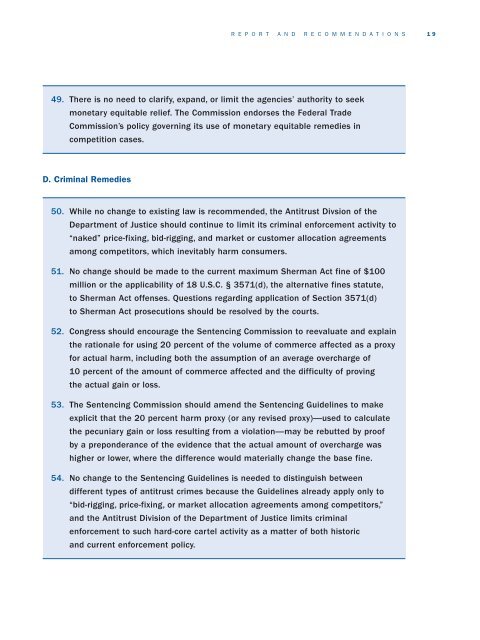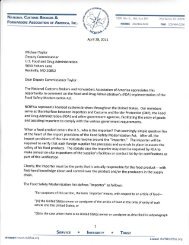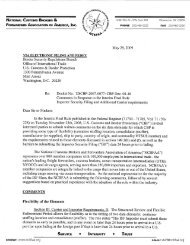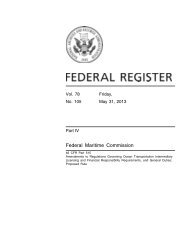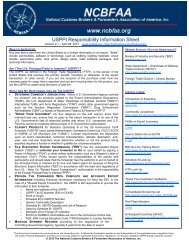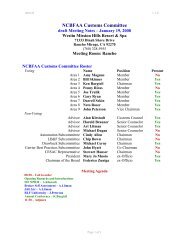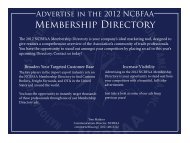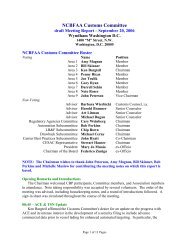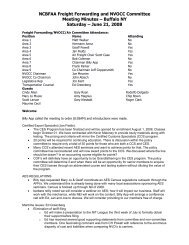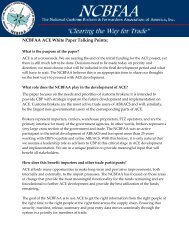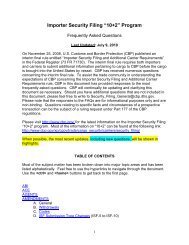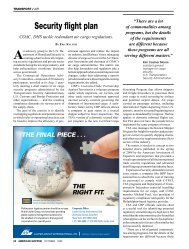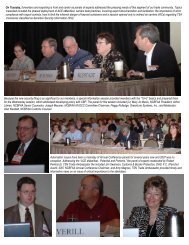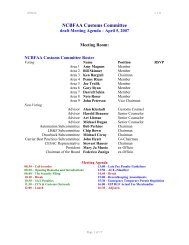- Page 1: Sherman Act, Section 1 (15 U.S.C.
- Page 4 and 5: U.S. antitrust enforcement has achi
- Page 6 and 7: Academy of Sciences designed to imp
- Page 8: ules is that one defendant can be l
- Page 11 and 12: possible to accomplish the intended
- Page 13 and 14: A CKNOWLEDGMENTSThe Commission reli
- Page 15 and 16: quarter, which no doubt added to th
- Page 17: T ABLE OF CONTENTSIntroduction and
- Page 20 and 21: 2 A N T I T R U S T M O D E R N I Z
- Page 22 and 23: 4 A N T I T R U S T M O D E R N I Z
- Page 24 and 25: 6 A N T I T R U S T M O D E R N I Z
- Page 26 and 27: 8 A N T I T R U S T M O D E R N I Z
- Page 28 and 29: 10 A N T I T R U S T M O D E R N I
- Page 30 and 31: 12 A N T I T R U S T M O D E R N I
- Page 32 and 33: 14 A N T I T R U S T M O D E R N I
- Page 34 and 35: 16 A N T I T R U S T M O D E R N I
- Page 38 and 39: 20 A N T I T R U S T M O D E R N I
- Page 40 and 41: 22 A N T I T R U S T M O D E R N I
- Page 42 and 43: 24 A N T I T R U S T M O D E R N I
- Page 44 and 45: 26 A N T I T R U S T M O D E R N I
- Page 46 and 47: 28 A N T I T R U S T M O D E R N I
- Page 49 and 50: R E P O R T A N D R E C O M M E N D
- Page 51 and 52: R E P O R T A N D R E C O M M E N D
- Page 53 and 54: R E P O R T A N D R E C O M M E N D
- Page 55 and 56: R E P O R T A N D R E C O M M E N D
- Page 57 and 58: R E P O R T A N D R E C O M M E N D
- Page 59 and 60: R E P O R T A N D R E C O M M E N D
- Page 61 and 62: R E P O R T A N D R E C O M M E N D
- Page 63 and 64: R E P O R T A N D R E C O M M E N D
- Page 65 and 66: R E P O R T A N D R E C O M M E N D
- Page 67 and 68: R E P O R T A N D R E C O M M E N D
- Page 69 and 70: R E P O R T A N D R E C O M M E N D
- Page 71 and 72: R E P O R T A N D R E C O M M E N D
- Page 73 and 74: R E P O R T A N D R E C O M M E N D
- Page 75 and 76: R E P O R T A N D R E C O M M E N D
- Page 77 and 78: R E P O R T A N D R E C O M M E N D
- Page 79 and 80: R E P O R T A N D R E C O M M E N D
- Page 81 and 82: R E P O R T A N D R E C O M M E N D
- Page 83 and 84: R E P O R T A N D R E C O M M E N D
- Page 85 and 86: R E P O R T A N D R E C O M M E N D
- Page 87 and 88:
R E P O R T A N D R E C O M M E N D
- Page 89 and 90:
R E P O R T A N D R E C O M M E N D
- Page 91 and 92:
R E P O R T A N D R E C O M M E N D
- Page 93 and 94:
R E P O R T A N D R E C O M M E N D
- Page 95 and 96:
R E P O R T A N D R E C O M M E N D
- Page 97:
R E P O R T A N D R E C O M M E N D
- Page 100 and 101:
82 A N T I T R U S T M O D E R N I
- Page 102 and 103:
84 A N T I T R U S T M O D E R N I
- Page 104 and 105:
86 A N T I T R U S T M O D E R N I
- Page 106 and 107:
88 A N T I T R U S T M O D E R N I
- Page 108 and 109:
90 A N T I T R U S T M O D E R N I
- Page 110 and 111:
92 A N T I T R U S T M O D E R N I
- Page 112 and 113:
94 A N T I T R U S T M O D E R N I
- Page 114 and 115:
96 A N T I T R U S T M O D E R N I
- Page 116 and 117:
98 A N T I T R U S T M O D E R N I
- Page 118 and 119:
100 A N T I T R U S T M O D E R N I
- Page 120 and 121:
102 A N T I T R U S T M O D E R N I
- Page 122 and 123:
104 A N T I T R U S T M O D E R N I
- Page 124 and 125:
106 A N T I T R U S T M O D E R N I
- Page 126 and 127:
108 A N T I T R U S T M O D E R N I
- Page 128 and 129:
110 A N T I T R U S T M O D E R N I
- Page 130 and 131:
112 A N T I T R U S T M O D E R N I
- Page 132 and 133:
114 A N T I T R U S T M O D E R N I
- Page 134 and 135:
116 A N T I T R U S T M O D E R N I
- Page 136 and 137:
118 A N T I T R U S T M O D E R N I
- Page 138 and 139:
120 A N T I T R U S T M O D E R N I
- Page 140 and 141:
122 A N T I T R U S T M O D E R N I
- Page 142 and 143:
124 A N T I T R U S T M O D E R N I
- Page 144 and 145:
126 A N T I T R U S T M O D E R N I
- Page 146 and 147:
128 A N T I T R U S T M O D E R N I
- Page 148 and 149:
130 A N T I T R U S T M O D E R N I
- Page 150 and 151:
132 A N T I T R U S T M O D E R N I
- Page 152 and 153:
134 A N T I T R U S T M O D E R N I
- Page 154 and 155:
136 A N T I T R U S T M O D E R N I
- Page 156 and 157:
138 A N T I T R U S T M O D E R N I
- Page 158 and 159:
140 A N T I T R U S T M O D E R N I
- Page 160 and 161:
142 A N T I T R U S T M O D E R N I
- Page 162 and 163:
144 A N T I T R U S T M O D E R N I
- Page 164 and 165:
146 A N T I T R U S T M O D E R N I
- Page 166 and 167:
148 A N T I T R U S T M O D E R N I
- Page 168 and 169:
150 A N T I T R U S T M O D E R N I
- Page 170 and 171:
152 A N T I T R U S T M O D E R N I
- Page 172 and 173:
154 A N T I T R U S T M O D E R N I
- Page 174 and 175:
156 A N T I T R U S T M O D E R N I
- Page 176 and 177:
158 A N T I T R U S T M O D E R N I
- Page 178 and 179:
160 A N T I T R U S T M O D E R N I
- Page 180 and 181:
162 A N T I T R U S T M O D E R N I
- Page 182 and 183:
164 A N T I T R U S T M O D E R N I
- Page 184 and 185:
166 A N T I T R U S T M O D E R N I
- Page 186 and 187:
168 A N T I T R U S T M O D E R N I
- Page 188 and 189:
170 A N T I T R U S T M O D E R N I
- Page 190 and 191:
172 A N T I T R U S T M O D E R N I
- Page 192 and 193:
174 A N T I T R U S T M O D E R N I
- Page 194 and 195:
176 A N T I T R U S T M O D E R N I
- Page 196 and 197:
178 A N T I T R U S T M O D E R N I
- Page 198 and 199:
180 A N T I T R U S T M O D E R N I
- Page 200 and 201:
182 A N T I T R U S T M O D E R N I
- Page 203 and 204:
R E P O R T A N D R E C O M M E N D
- Page 205 and 206:
R E P O R T A N D R E C O M M E N D
- Page 207 and 208:
R E P O R T A N D R E C O M M E N D
- Page 209 and 210:
R E P O R T A N D R E C O M M E N D
- Page 211 and 212:
R E P O R T A N D R E C O M M E N D
- Page 213 and 214:
R E P O R T A N D R E C O M M E N D
- Page 215 and 216:
R E P O R T A N D R E C O M M E N D
- Page 217 and 218:
R E P O R T A N D R E C O M M E N D
- Page 219 and 220:
R E P O R T A N D R E C O M M E N D
- Page 221 and 222:
R E P O R T A N D R E C O M M E N D
- Page 223 and 224:
R E P O R T A N D R E C O M M E N D
- Page 225 and 226:
R E P O R T A N D R E C O M M E N D
- Page 227 and 228:
R E P O R T A N D R E C O M M E N D
- Page 229 and 230:
R E P O R T A N D R E C O M M E N D
- Page 231 and 232:
R E P O R T A N D R E C O M M E N D
- Page 233 and 234:
R E P O R T A N D R E C O M M E N D
- Page 235 and 236:
R E P O R T A N D R E C O M M E N D
- Page 237 and 238:
R E P O R T A N D R E C O M M E N D
- Page 239 and 240:
R E P O R T A N D R E C O M M E N D
- Page 241 and 242:
R E P O R T A N D R E C O M M E N D
- Page 243 and 244:
R E P O R T A N D R E C O M M E N D
- Page 245 and 246:
R E P O R T A N D R E C O M M E N D
- Page 247 and 248:
R E P O R T A N D R E C O M M E N D
- Page 249 and 250:
R E P O R T A N D R E C O M M E N D
- Page 251 and 252:
R E P O R T A N D R E C O M M E N D
- Page 253 and 254:
R E P O R T A N D R E C O M M E N D
- Page 255 and 256:
R E P O R T A N D R E C O M M E N D
- Page 257:
R E P O R T A N D R E C O M M E N D
- Page 260 and 261:
242 A N T I T R U S T M O D E R N I
- Page 262 and 263:
244 A N T I T R U S T M O D E R N I
- Page 264 and 265:
246 A N T I T R U S T M O D E R N I
- Page 266 and 267:
248 A N T I T R U S T M O D E R N I
- Page 268 and 269:
250 A N T I T R U S T M O D E R N I
- Page 270 and 271:
252 A N T I T R U S T M O D E R N I
- Page 272 and 273:
254 A N T I T R U S T M O D E R N I
- Page 274 and 275:
256 A N T I T R U S T M O D E R N I
- Page 276 and 277:
258 A N T I T R U S T M O D E R N I
- Page 278 and 279:
260 A N T I T R U S T M O D E R N I
- Page 280 and 281:
262 A N T I T R U S T M O D E R N I
- Page 282 and 283:
264 A N T I T R U S T M O D E R N I
- Page 284 and 285:
266 A N T I T R U S T M O D E R N I
- Page 286 and 287:
268 A N T I T R U S T M O D E R N I
- Page 288 and 289:
270 A N T I T R U S T M O D E R N I
- Page 290 and 291:
272 A N T I T R U S T M O D E R N I
- Page 292 and 293:
274 A N T I T R U S T M O D E R N I
- Page 294 and 295:
276 A N T I T R U S T M O D E R N I
- Page 296 and 297:
278 A N T I T R U S T M O D E R N I
- Page 298 and 299:
280 A N T I T R U S T M O D E R N I
- Page 300 and 301:
282 A N T I T R U S T M O D E R N I
- Page 303 and 304:
R E P O R T A N D R E C O M M E N D
- Page 305 and 306:
R E P O R T A N D R E C O M M E N D
- Page 307 and 308:
R E P O R T A N D R E C O M M E N D
- Page 309:
R E P O R T A N D R E C O M M E N D
- Page 312 and 313:
294 A N T I T R U S T M O D E R N I
- Page 314 and 315:
296 A N T I T R U S T M O D E R N I
- Page 316 and 317:
298 A N T I T R U S T M O D E R N I
- Page 318 and 319:
300 A N T I T R U S T M O D E R N I
- Page 320 and 321:
302 A N T I T R U S T M O D E R N I
- Page 322 and 323:
304 A N T I T R U S T M O D E R N I
- Page 324 and 325:
306 A N T I T R U S T M O D E R N I
- Page 326 and 327:
308 A N T I T R U S T M O D E R N I
- Page 329 and 330:
R E P O R T A N D R E C O M M E N D
- Page 331 and 332:
R E P O R T A N D R E C O M M E N D
- Page 333 and 334:
R E P O R T A N D R E C O M M E N D
- Page 335 and 336:
R E P O R T A N D R E C O M M E N D
- Page 337 and 338:
R E P O R T A N D R E C O M M E N D
- Page 339 and 340:
R E P O R T A N D R E C O M M E N D
- Page 341 and 342:
R E P O R T A N D R E C O M M E N D
- Page 343 and 344:
R E P O R T A N D R E C O M M E N D
- Page 345 and 346:
R E P O R T A N D R E C O M M E N D
- Page 347 and 348:
R E P O R T A N D R E C O M M E N D
- Page 349 and 350:
R E P O R T A N D R E C O M M E N D
- Page 351 and 352:
R E P O R T A N D R E C O M M E N D
- Page 353 and 354:
R E P O R T A N D R E C O M M E N D
- Page 355 and 356:
R E P O R T A N D R E C O M M E N D
- Page 357 and 358:
R E P O R T A N D R E C O M M E N D
- Page 359 and 360:
R E P O R T A N D R E C O M M E N D
- Page 361 and 362:
R E P O R T A N D R E C O M M E N D
- Page 363 and 364:
R E P O R T A N D R E C O M M E N D
- Page 365 and 366:
R E P O R T A N D R E C O M M E N D
- Page 367 and 368:
R E P O R T A N D R E C O M M E N D
- Page 369 and 370:
R E P O R T A N D R E C O M M E N D
- Page 371 and 372:
R E P O R T A N D R E C O M M E N D
- Page 373 and 374:
R E P O R T A N D R E C O M M E N D
- Page 375 and 376:
R E P O R T A N D R E C O M M E N D
- Page 377 and 378:
R E P O R T A N D R E C O M M E N D
- Page 379 and 380:
R E P O R T A N D R E C O M M E N D
- Page 381 and 382:
R E P O R T A N D R E C O M M E N D
- Page 383 and 384:
R E P O R T A N D R E C O M M E N D
- Page 385 and 386:
R E P O R T A N D R E C O M M E N D
- Page 387 and 388:
R E P O R T A N D R E C O M M E N D
- Page 389 and 390:
R E P O R T A N D R E C O M M E N D
- Page 391 and 392:
R E P O R T A N D R E C O M M E N D
- Page 393 and 394:
R E P O R T A N D R E C O M M E N D
- Page 395 and 396:
R E P O R T A N D R E C O M M E N D
- Page 397 and 398:
R E P O R T A N D R E C O M M E N D
- Page 399 and 400:
R E P O R T A N D R E C O M M E N D
- Page 401 and 402:
R E P O R T A N D R E C O M M E N D
- Page 403 and 404:
R E P O R T A N D R E C O M M E N D
- Page 405 and 406:
R E P O R T A N D R E C O M M E N D
- Page 407 and 408:
R E P O R T A N D R E C O M M E N D
- Page 409 and 410:
R E P O R T A N D R E C O M M E N D
- Page 411 and 412:
R E P O R T A N D R E C O M M E N D
- Page 413 and 414:
R E P O R T A N D R E C O M M E N D
- Page 415 and 416:
R E P O R T A N D R E C O M M E N D
- Page 417 and 418:
R E P O R T A N D R E C O M M E N D
- Page 419 and 420:
R E P O R T A N D R E C O M M E N D
- Page 421 and 422:
R E P O R T A N D R E C O M M E N D
- Page 423 and 424:
R E P O R T A N D R E C O M M E N D
- Page 425 and 426:
R E P O R T A N D R E C O M M E N D
- Page 427 and 428:
R E P O R T A N D R E C O M M E N D
- Page 429 and 430:
R E P O R T A N D R E C O M M E N D
- Page 431 and 432:
R E P O R T A N D R E C O M M E N D
- Page 433 and 434:
R E P O R T A N D R E C O M M E N D
- Page 435 and 436:
R E P O R T A N D R E C O M M E N D
- Page 437 and 438:
R E P O R T A N D R E C O M M E N D
- Page 439 and 440:
R E P O R T A N D R E C O M M E N D
- Page 441 and 442:
R E P O R T A N D R E C O M M E N D
- Page 443 and 444:
R E P O R T A N D R E C O M M E N D
- Page 445 and 446:
R E P O R T A N D R E C O M M E N D
- Page 447 and 448:
R E P O R T A N D R E C O M M E N D
- Page 449 and 450:
R E P O R T A N D R E C O M M E N D
- Page 451 and 452:
R E P O R T A N D R E C O M M E N D
- Page 453 and 454:
R E P O R T A N D R E C O M M E N D
- Page 455 and 456:
R E P O R T A N D R E C O M M E N D
- Page 457 and 458:
R E P O R T A N D R E C O M M E N D
- Page 459 and 460:
R E P O R T A N D R E C O M M E N D
- Page 461 and 462:
R E P O R T A N D R E C O M M E N D
- Page 463 and 464:
R E P O R T A N D R E C O M M E N D
- Page 465 and 466:
R E P O R T A N D R E C O M M E N D
- Page 467:
R E P O R T A N D R E C O M M E N D
- Page 470 and 471:
A.2 A N T I T R U S T M O D E R N I
- Page 472 and 473:
A.4 A N T I T R U S T M O D E R N I
- Page 474 and 475:
A.6 A N T I T R U S T M O D E R N I
- Page 476 and 477:
A.8 A N T I T R U S T M O D E R N I
- Page 478 and 479:
A.10 A N T I T R U S T M O D E R N
- Page 480 and 481:
A.12 A N T I T R U S T M O D E R N
- Page 482 and 483:
A.14 A N T I T R U S T M O D E R N
- Page 484 and 485:
A.16 A N T I T R U S T M O D E R N
- Page 486 and 487:
A.18 A N T I T R U S T M O D E R N
- Page 488 and 489:
A.20 A N T I T R U S T M O D E R N
- Page 490 and 491:
A.22 A N T I T R U S T M O D E R N
- Page 492 and 493:
A.24 A N T I T R U S T M O D E R N
- Page 494 and 495:
A.26 A N T I T R U S T M O D E R N
- Page 496 and 497:
A.28 A N T I T R U S T M O D E R N
- Page 498 and 499:
A.30 A N T I T R U S T M O D E R N
- Page 500 and 501:
A.32 A N T I T R U S T M O D E R N
- Page 502 and 503:
A.34 A N T I T R U S T M O D E R N
- Page 504 and 505:
A.36 A N T I T R U S T M O D E R N
- Page 506 and 507:
A.38 A N T I T R U S T M O D E R N
- Page 508 and 509:
A.40 A N T I T R U S T M O D E R N
- Page 510 and 511:
A.42 A N T I T R U S T M O D E R N
- Page 512 and 513:
A.44 A N T I T R U S T M O D E R N
- Page 514 and 515:
A.46 A N T I T R U S T M O D E R N
- Page 516 and 517:
A.48 A N T I T R U S T M O D E R N
- Page 518 and 519:
A.50 A N T I T R U S T M O D E R N
- Page 520 and 521:
A.52 A N T I T R U S T M O D E R N
- Page 522 and 523:
A.54 A N T I T R U S T M O D E R N
- Page 524 and 525:
A.56 A N T I T R U S T M O D E R N
- Page 526 and 527:
A.58 A N T I T R U S T M O D E R N
- Page 528 and 529:
A.60 A N T I T R U S T M O D E R N
- Page 530 and 531:
A.62 A N T I T R U S T M O D E R N
- Page 532 and 533:
A.64 A N T I T R U S T M O D E R N
- Page 534 and 535:
A.66 A N T I T R U S T M O D E R N
- Page 536 and 537:
A.68 A N T I T R U S T M O D E R N
- Page 538:
Printing:Imperial Graphics · Strat


